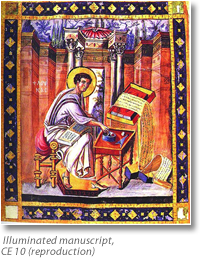
 |
Fall Exhibit Highlights
Thesaurus Linguae Graecae
 Since 1972 UCI has been home to
the pioneering Thesaurus Linguae
Graecae® (TLG®) Project, which
seeks to create a comprehensive
digital library of Greek literature
from antiquity to the present era.
In recognition of the project’s status
as one of the world’s pioneering
humanities computing projects, the
UCI Libraries have acquired
the TLG archive to
preserve for the benefit
of future scholars.
To celebrate
this important
acquisition, we
present our fall
exhibit, From Papyrus
to Digital: UCI’s
Thesaurus of Ancient
Greek Texts.
Since 1972 UCI has been home to
the pioneering Thesaurus Linguae
Graecae® (TLG®) Project, which
seeks to create a comprehensive
digital library of Greek literature
from antiquity to the present era.
In recognition of the project’s status
as one of the world’s pioneering
humanities computing projects, the
UCI Libraries have acquired
the TLG archive to
preserve for the benefit
of future scholars.
To celebrate
this important
acquisition, we
present our fall
exhibit, From Papyrus
to Digital: UCI’s
Thesaurus of Ancient
Greek Texts.
 The exhibit first traces the
transmission of the Greek text via an
array of media–from fragile papyri
and stone inscriptions, to codex
manuscripts and printed books–that
have been used to distribute and
preserve Greek texts over the past
3,000 years. Rare books dating from
the 16th through the 21st centuries
illustrate the range of printing
techniques, translations, scholarly
apparatus, and artistic interpretation
that have been applied to ancient
texts over the centuries. Classical
authors whose works are
represented include
philosophers Plato and
Aristotle, playwrights
Euripides and
Aristophanes, the
epic poet Homer,
the fabulist Aesop,
the physician
Hippocrates, and
others. Also included
is copy of the Thesaurus
Graecae Linguae, the first
comprehensive dictionary of
the Greek language, which was
published by Henri Estienne (also
known as Stephanus) in Geneva in
1572 and served as the inspiration
for TLG’s name and concept.
The exhibit first traces the
transmission of the Greek text via an
array of media–from fragile papyri
and stone inscriptions, to codex
manuscripts and printed books–that
have been used to distribute and
preserve Greek texts over the past
3,000 years. Rare books dating from
the 16th through the 21st centuries
illustrate the range of printing
techniques, translations, scholarly
apparatus, and artistic interpretation
that have been applied to ancient
texts over the centuries. Classical
authors whose works are
represented include
philosophers Plato and
Aristotle, playwrights
Euripides and
Aristophanes, the
epic poet Homer,
the fabulist Aesop,
the physician
Hippocrates, and
others. Also included
is copy of the Thesaurus
Graecae Linguae, the first
comprehensive dictionary of
the Greek language, which was
published by Henri Estienne (also
known as Stephanus) in Geneva in
1572 and served as the inspiration
for TLG’s name and concept.
 The exhibit next explores
how the TLG undertook the
monumental task of creating a
comprehensive digital library
of Greek texts at a time when
the necessary technologies
did not exist. The central
roles played by UCI alumna
Marianne McDonald and
pioneering computer scientist
David Packard are highlighted.
A collection of artifacts and
publications illustrates the
development of the TLG
and its technologies, which
began at the most basic level
of designing the software
to store, display, and print
letters in the Greek alphabet.
Distribution of TLG data to
the scholarly community
began with keyword-incontext
printouts in the 1970s,
progressed to CD-ROMs in
the mid-1980s, and as of 2000,
culminated in today’s globally
available web interface. Today,
the TLG is an internationally
recognized research center. Access
to TLG data aids scholarship in a
variety of disciplines, including
Classics, Ancient and Byzantine
History, Linguistics, and Religious
Studies.
The exhibit next explores
how the TLG undertook the
monumental task of creating a
comprehensive digital library
of Greek texts at a time when
the necessary technologies
did not exist. The central
roles played by UCI alumna
Marianne McDonald and
pioneering computer scientist
David Packard are highlighted.
A collection of artifacts and
publications illustrates the
development of the TLG
and its technologies, which
began at the most basic level
of designing the software
to store, display, and print
letters in the Greek alphabet.
Distribution of TLG data to
the scholarly community
began with keyword-incontext
printouts in the 1970s,
progressed to CD-ROMs in
the mid-1980s, and as of 2000,
culminated in today’s globally
available web interface. Today,
the TLG is an internationally
recognized research center. Access
to TLG data aids scholarship in a
variety of disciplines, including
Classics, Ancient and Byzantine
History, Linguistics, and Religious
Studies.
Maria Pantelia, Thesaurus Linguae Graecae Director and Professor of Classics, served as curator. She has published and lectured extensively on ancient Greek literature and the application of digital technologies in Humanities research and pedagogy.
From Papyrus to Digital opens on November 9th and will remain on view through April 2005.
For information about the opening event, please contact Julie Sully, Associate Director of Development (jsully@uci.edu or x44658).
For more details about the exhibit itself, contact Jackie Dooley, Head of Special Collections and Archives (jmdooley@uci.edu or x44935).
|